外研版英语七年级下Revision moduleB课件(36张PPT无素材)
文档属性
| 名称 | 外研版英语七年级下Revision moduleB课件(36张PPT无素材) |
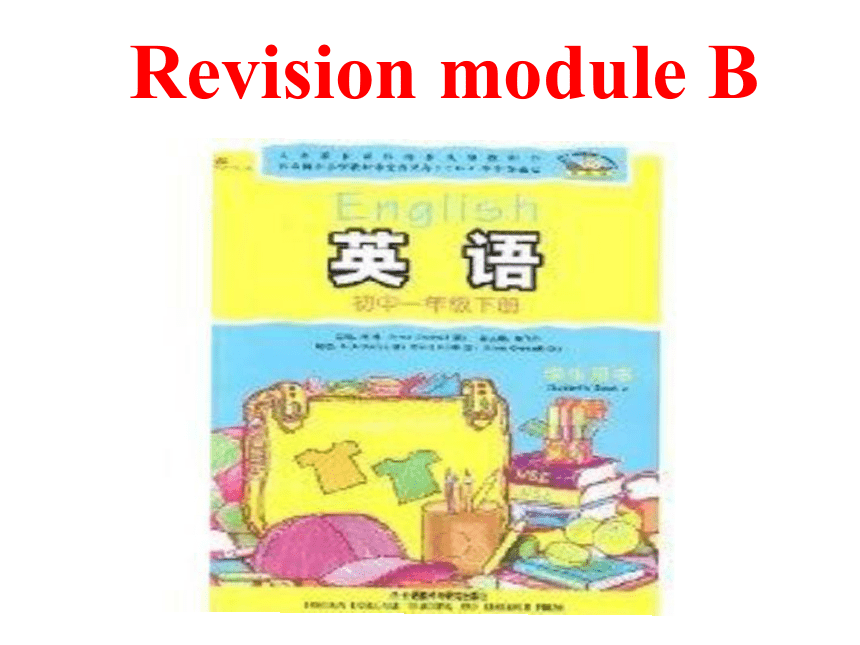
|
|
| 格式 | zip | ||
| 文件大小 | 1.3MB | ||
| 资源类型 | 教案 | ||
| 版本资源 | 外研版 | ||
| 科目 | 英语 | ||
| 更新时间 | 2020-06-02 00:00:00 | ||
图片预览

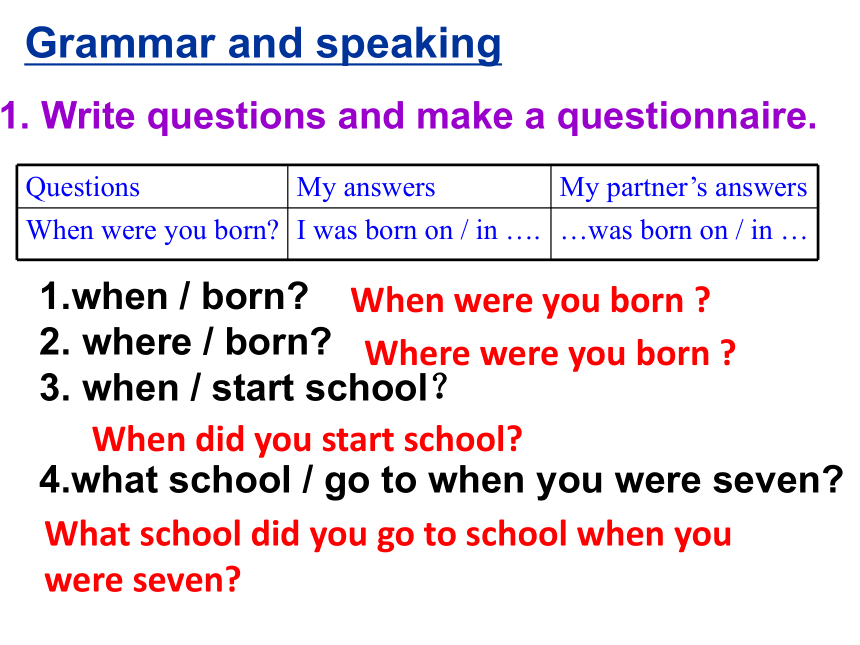
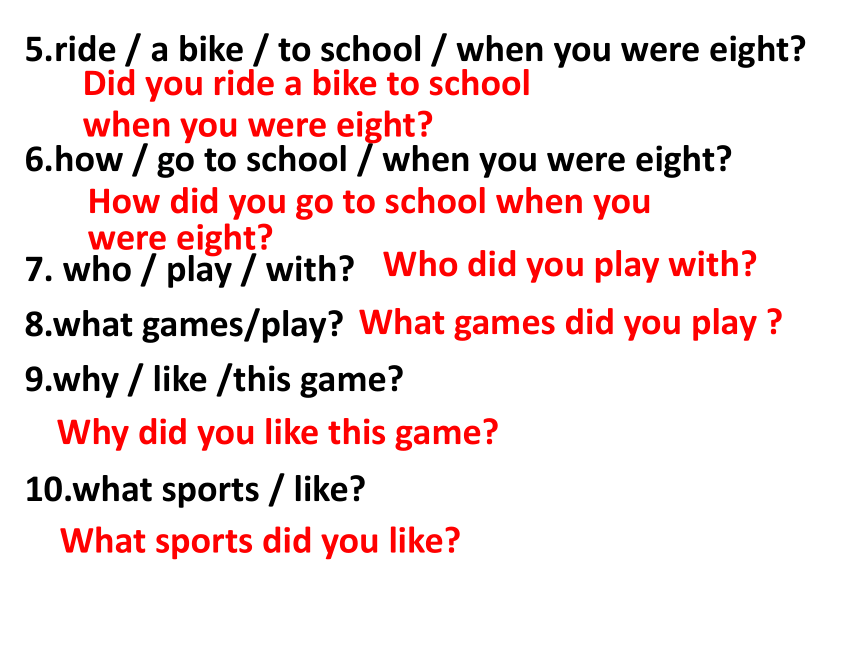
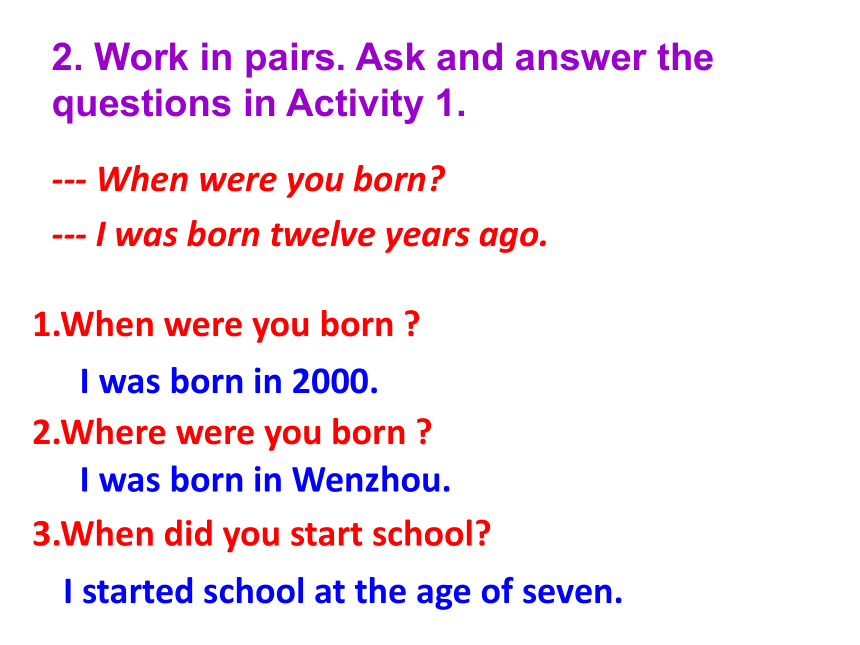
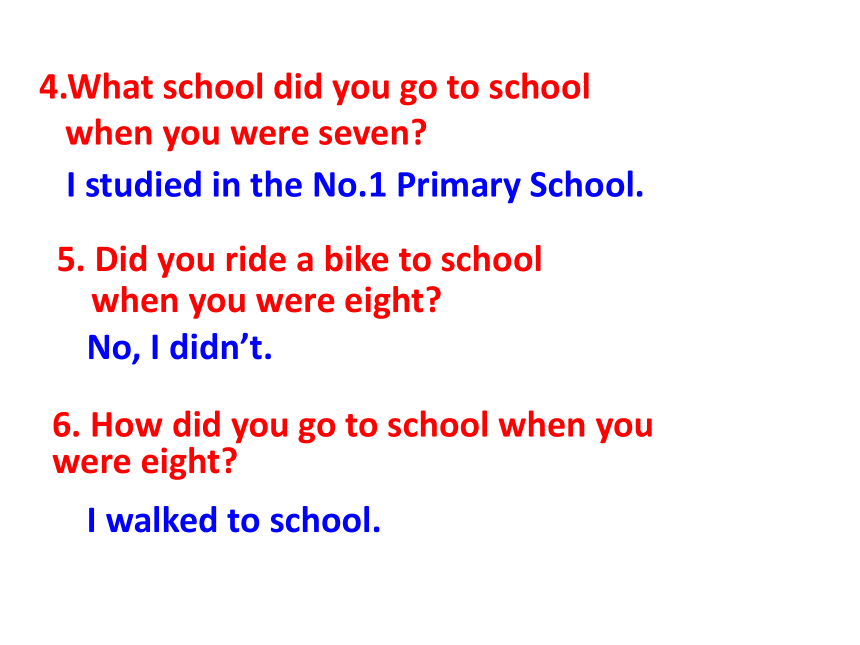


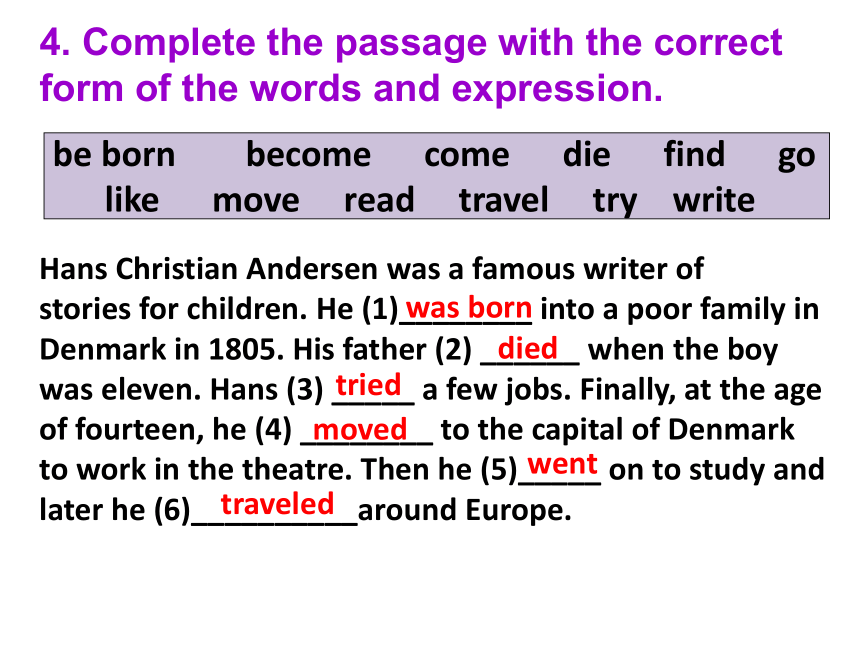

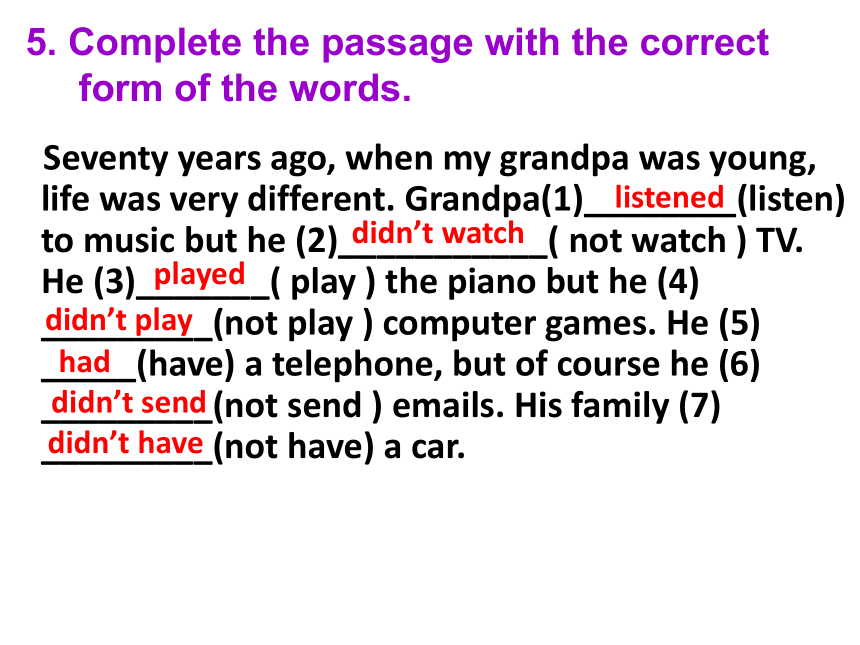
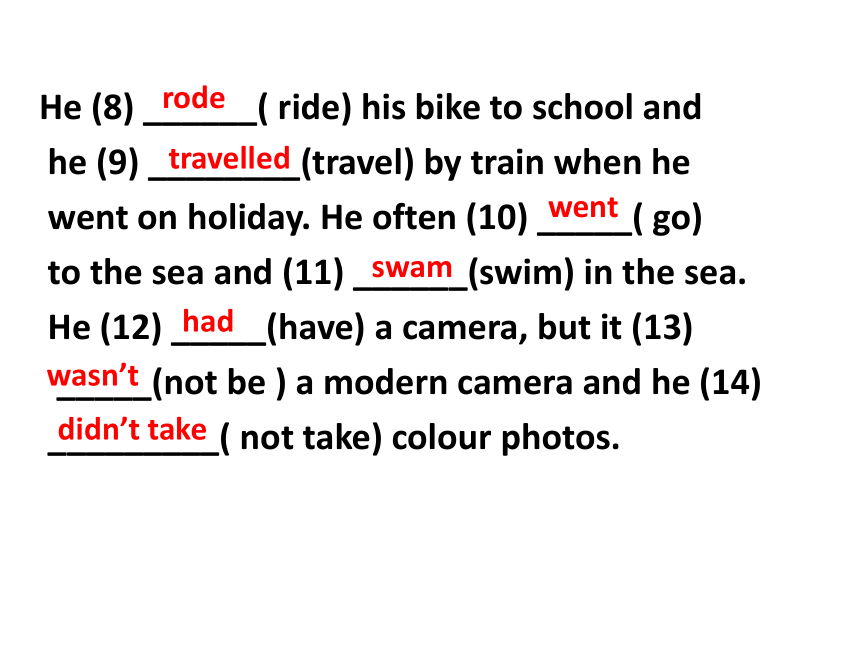
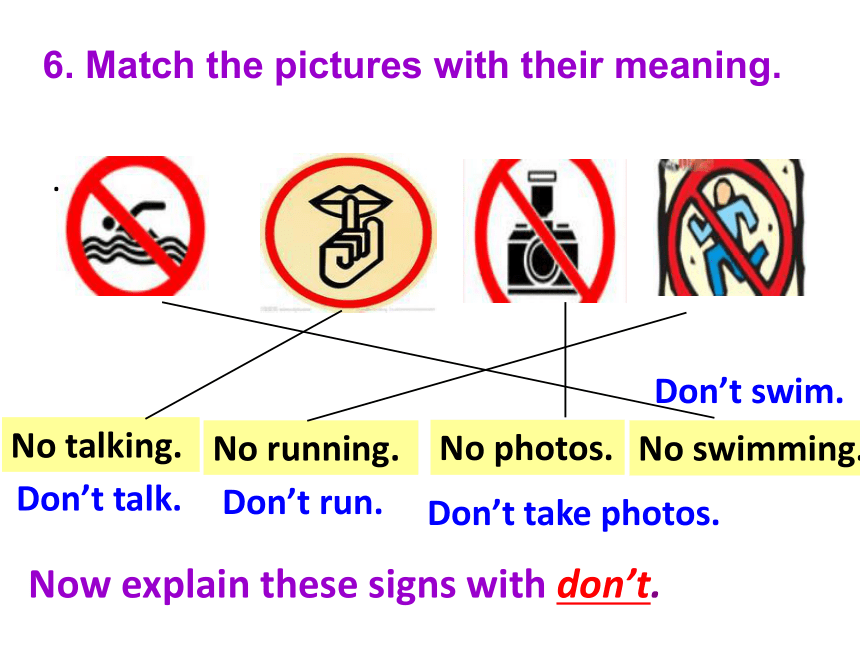
文档简介
(共36张PPT)
Revision
module
B
1.
Write
questions
and
make
a
questionnaire.
Questions
My
answers
My
partner’s
answers
When
were
you
born?
I
was
born
on
/
in
….
…was
born
on
/
in
…
when
/
born?
where
/
born?
when
/
start
school?
4.what
school
/
go
to
when
you
were
seven?
When
were
you
born
?
Where
were
you
born
?
When
did
you
start
school?
What
school
did
you
go
to
school
when
you
were
seven?
Grammar
and
speaking
5.ride
/
a
bike
/
to
school
/
when
you
were
eight?
6.how
/
go
to
school
/
when
you
were
eight?
7.
who
/
play
/
with?
8.what
games/play?
9.why
/
like
/this
game?
10.what
sports
/
like?
Did
you
ride
a
bike
to
school
when
you
were
eight?
How
did
you
go
to
school
when
you
were
eight?
Who
did
you
play
with?
What
games
did
you
play
?
Why
did
you
like
this
game?
What
sports
did
you
like?
2.
Work
in
pairs.
Ask
and
answer
the
questions
in
Activity
1.
---
When
were
you
born?
---
I
was
born
twelve
years
ago.
1.When
were
you
born
?
2.Where
were
you
born
?
3.When
did
you
start
school?
I
was
born
in
Wenzhou.
I
was
born
in
2000.
I
started
school
at
the
age
of
seven.
4.What
school
did
you
go
to
school
when
you
were
seven?
I
studied
in
the
No.1
Primary
School.
5.
Did
you
ride
a
bike
to
school
when
you
were
eight?
No,
I
didn’t.
I
walked
to
school.
6.
How
did
you
go
to
school
when
you
were
eight?
7.
Who
did
you
play
with?
8.
What
games
did
you
play
?
9.
Why
did
you
like
this
game?
10.
What
sports
did
you
like?
I
played
with
my
friend,
Xiaoming.
We
played
“Flight
chess”(飞行棋).
Because
it
is
interesting.
I
like
playing
basketball.
3.
Write
you
and
your
partner’s
answers
on
your
questionnaire.
I
was
born
in
Wenzhou
in
2000.
I
went
to
school
at
the
age
of
seven.
My
school
was
No.1
Primary
School.
My
home
is
near
the
school
so
I
went
to
school
on
foot
every
day.
I
like
playing
basketball
and
I
also
play
“Flight
Chess”
with
my
friend,
Xiaoming.
He
is
as
old
as
I.
He
was
from
Chongqi
.
We
were
in
the
same
class.
We
helped
and
learnt
from
each
other.
We
were
happy
when
we
were
in
primary
school.
4.
Complete
the
passage
with
the
correct
form
of
the
words
and
expression.
be
born
become
come
die
find
go
like
move
read
travel
try
write
Hans
Christian
Andersen
was
a
famous
writer
of
stories
for
children.
He
(1)________
into
a
poor
family
in
Denmark
in
1805.
His
father
(2)
______
when
the
boy
was
eleven.
Hans
(3)
_____
a
few
jobs.
Finally,
at
the
age
of
fourteen,
he
(4)
________
to
the
capital
of
Denmark
to
work
in
the
theatre.
Then
he
(5)_____
on
to
study
and
later
he
(6)__________around
Europe.
was
born
died
tried
moved
went
traveled
His
first
book
(7)
_____
out
in
1822.
He
(8)______
many
stories
for
children,
but
older
people
also
(9)
______
them
interesting.
Many
of
his
stories
(10)
_____
very
famous,
like
The
Ugly
Duckling
and
The
Little
Match
Girl.
People
still
(11)____
to
read
them
today
and
they
can
(12)
____
them
in
many
languages.
came
wrote
found
became
like
read
5.
Complete
the
passage
with
the
correct
form
of
the
words.
Seventy
years
ago,
when
my
grandpa
was
young,
life
was
very
different.
Grandpa(1)________(listen)
to
music
but
he
(2)___________(
not
watch
)
TV.
He
(3)_______(
play
)
the
piano
but
he
(4)
_________(not
play
)
computer
games.
He
(5)
_____(have)
a
telephone,
but
of
course
he
(6)
_________(not
send
)
emails.
His
family
(7)
_________(not
have)
a
car.
listened
didn’t
watch
played
had
didn’t
play
didn’t
send
didn’t
have
He
(8)
______(
ride)
his
bike
to
school
and
he
(9)
________(travel)
by
train
when
he
went
on
holiday.
He
often
(10)
_____(
go)
to
the
sea
and
(11)
______(swim)
in
the
sea.
He
(12)
_____(have)
a
camera,
but
it
(13)
_____(not
be
)
a
modern
camera
and
he
(14)
_________(
not
take)
colour
photos.
rode
travelled
went
swam
had
wasn’t
didn’t
take
6.
Match
the
pictures
with
their
meaning.
No
talking.
.
No
running.
No
photos.
No
swimming.
Now
explain
these
signs
with
don’t.
Don’t
talk.
Don’t
run.
Don’t
take
photos.
Don’t
swim.
7.
Rewrite
the
sentences
with
what.
It
is
a
nice
present.
_______
nice
present
it
is!
2.
It’s
a
fine
day
today.
_______________
it
is
today!
3.
They
live
a
happy
life
today!
_____________
life
they
live
today!
4.
It
was
wonderful
music.
__________________
it
was!
What
a
What
a
fine
day
What
a
happy
What
wonderful
music
Vocabulary
The
blues
comes
from
America.
It's
____,
sad
music.
2.
Our
music
teacher
can
play
_______
as
well
as
traditional
music.
3.
We
like
pop
music
because
it’s
good
____.
8.
Complete
the
sentences
with
the
words
from
the
box.
beautiful
fun
modern
music
sad
slow
slow
modern
fun
4.
Opera
is
a
kind
of
play
with
______.
5.
This
song
is
really
___________.
I
like
it
a
lot.
6.
This
music
makes
me
feel
________.
beautiful
fun
modern
music
sad
slow
music
beautiful
sad
9.
Complete
the
passage
with
the
correct
form
of
the
expressions
from
the
box.
arm
in
arm
kiss
each
other
shake
hands
stand
close
People
from
different
countries
do
things
in
different
ways.
In
China,
people
usually
(1)
___________
when
they
meet
but
in
some
countries,
like
Russia,
people
(2)_______________.
People
in
the
Middle
East
(3)
____________
to
each
other,
but
people
from
the
US
don’t.
Chinese
girls
often
walk
(4)
_____________
but
people
from
Britain
don’t
touch
each
other
very
often.
shake
hands
kiss
each
other
stand
close
arm
in
arm
Look
at
the
pictures
and
fill
in.
_______
often
______.
Japanese
bow
______
people
often
_____
_____.
Maori
touch
noses
In
the
______
,people______
_____,
______
or
_____
when
they
meet.
shake
hands
kiss
hug
US
We
______
people
often
______
______
and
______.
Chinese
shake
hands
smile
—
What
do
you
do
and
say
when
you
meet
your
teacher
in
the
morning?
—
I
smile
and
say
good
morning.
—
What
do
you
do
and
say
when
you
meet
a
Russian?
—
I
smile,
say
hello
and
kiss
each
other
three
times.
How
close
do
you
stand
when
you
talk
to
a
friend?
You
can
stand
c____
to
in
the
Middle
East,
but
don’t
stand
too
close
to
North
American!
Give
them
more
p_______
space.
How
about
touching
people?
Chinese
girls
often
walk
a_____
in
arm
with
their
friends.
South
Americans
sometimes
hold
your
arm
when
they
talk
to
you,
so
you
can’t
m_______
away!
But
in
Britain
many
people
don’t
like
other
people
to
touch
them
at
a___.
lose
ersonal
rm
ove
ll
Do
you
look
at
people
when
you
talk?
In
some
places
,
it
isn’t
p_____
to
look
at
people
when
you
talk,
but
in
o______
counties
it
isn’t
polite
to
look
somewhere
e_____
.In
Britain
and
the
US,
people
usually
look
at
e_____
other
when
they
talk.
And
how
do
you
say
goodbye?
That’s
easy,
to
say
goodbye.
But
be
careful!
In
G____
,it’s
not
at
all
polite
!In
f_______
,it’s
very
rude!
olite
ther
lse
ach
reece
act
10.
Complete
the
email
with
the
correct
form
of
the
words
from
the
box.
You
can
use
some
of
the
words
twice.
arrive
buy
come
do
go
have
look
take
visit
Henry,
Hi!
I’m
on
holiday
in
London
with
my
friend
Jenny.
We(1)________by
plane
on
Monday
and
(2)
_____
a
taxi
to
our
hotel
in
central
London.
I
(3)
________
for
a
walk
in
Hyde
Park
but
Jenny
was
tired
so
she
didn’t
(4)
_________.
arrived
took
went
come
arrive
buy
come
do
go
have
look
take
visit
Yesterday
morning
we
first
(5)
________
Big
Ben
and
Buckingham
Palace.
Queen
Elizabeth
lives
in
the
Palace,
but
we
didn’t
see
her!
Then
we
(6)
____
the
British
Museum
and
(7)
________
dinner
in
a
Chinese
restaurant.
Today
we
went
to
Tower
Bridge
on
the
River
Thames
and
(8)________at
the
city.
It’s
very
big!
This
afternoon
we
(9)
______
some
shopping.
Jenny
didn’t
buy
anything,
but
I
(10
)
________
a
present
for
you
and
I
posted
it
just
now.
I
hope
you’ll
like
it!
Say
hello
to
your
mum
and
dad.
Emma
visited
visited
had
looked
did
bought
Listening
and
speaking
Tony
went
to
London
/
Hong
Kong.
It
took
four
/
five
hours
to
get
there.
Tony’s
uncle
/
aunt
met
them
at
the
airport.
Tony
saw
a
big
ship
/
a
dragon
boat.
Tony
bought
a
present
/
some
postcards
for
Lingling.
11.
Listen
and
choose
the
correct
answer.
12.
Write
the
conversation.
A:
where
/
go
/
on
holiday?
B:
to
the
sea
A:what
/
you
/
do
?
B:
swim
in
sea,
eat
in
restaurant
A:
you
/
buy
/
presents?
B:
yes,
/
spend
/
lot
of
money
Where
did
you
go
on
holiday?
I
went
to
the
sea.
Where
did
you
do?
I
swam
in
the
sea
and
ate
in
the
restaurant.
Yes,
I
spent
a
lot
of
money.
Did
you
buy
any
presents?
13.
Listen
to
the
poem
and
read.
There
was
a
little
girl
By
Henry
Wadsworth
Longfellow
There
was
a
little
girl,
Who
had
a
little
curl
Right
in
the
middle
of
her
forehead.
And
when
she
was
good,
She
was
very,
very
good,
But
when
she
was
bad,
She
was
horrid!
[`h?r?d]
adj.可怕的;很不友好的
Reading
1.
Where
does
blues
music
come
from?
2.
What
kind
of
music
is
the
blues?
3.
Is
rock
good
for
dancing?
4.Which
came
first,
rock
music
or
the
blues?
5.
When
did
rock
music
begin?
6.
Where
did
rap
music
start?
14.
Read
the
passage
and
answer
the
questions.
Blues
music
comes
from
America.
The
blues
is
sad,
slow
music.
Yes,
it
is.
The
blues.
In
the
1950s.
On
the
streets
of
New
York
City.
American
music
1900--2000
African
Americans
added
a
lot
to
the
history
of
music
between
1900
and
2000.
Blues,
rock
and
rap
are
all
important
musical
developments.
The
blues
is
sad,
slow
music
from
America.
Blues
musicians
are
often
African
Americans.
Blues
songs
often
tell
sad
stories
because
Africans
in
America
had
difficult
lives.
Rock
music
comes
from
America
too.
It
started
in
the
1950s.
The
slow,
sad
blues
and
American
country
music
come
together
to
make
rock.
It’s
good
for
dancing.
Blues
musicians
usually
play
alone,
but
rock
musicians
usually
play
together.
Rap
music
comes
from
African
American
music.
It
first
started
in
the
1970s
when
young
African
Americans
played
on
the
streets
of
New
York
City.
Many
people
now
think
that
the
words
of
rap
music
are
really
poems.
Rap
is
very
important
in
pop
music.
Writing
Did
you
go
to
school
from
Monday
to
Friday?
Did
anything
interesting
happen
in
school?
What
did
you
learn
in
your
favourite
class?
Did
you
do
sports
at
school?
What
did
you
do
last
weekend?
15.
Work
in
pairs.
Ask
and
answer
the
questions
about
what
you
did
last
week.
Yes,
I
did.
No,
it
didn’t.
I
learnt
about
English
history.
Yes,
I
did.
I
did
some
cleaning
and
did
some
shopping
with
my
mother.
16.
Write
down
your
answers
to
Activity
15.
I
went
to
school
from
Monday
to
Friday.
…
17.
Put
your
sentences
together.
Use
words
like
on
Monday,
and,
so,
but,
because,
first,
next
and
finally.
I
went
to
school
from
Monday
to
Friday.
On
Tuesday
afternoon
we
had
a
basketball
match
with
Class
2
…
Homework
1.
Revise
words
and
expressions
from
Module
1
to
Module
10.
2.
Revise
Pronunciation
guide
(Ⅰ)
and
(Ⅱ).
3.
Getting
ready
for
final
exam.
Wish
you
all
progress!
Goodbye!
Revision
module
B
1.
Write
questions
and
make
a
questionnaire.
Questions
My
answers
My
partner’s
answers
When
were
you
born?
I
was
born
on
/
in
….
…was
born
on
/
in
…
when
/
born?
where
/
born?
when
/
start
school?
4.what
school
/
go
to
when
you
were
seven?
When
were
you
born
?
Where
were
you
born
?
When
did
you
start
school?
What
school
did
you
go
to
school
when
you
were
seven?
Grammar
and
speaking
5.ride
/
a
bike
/
to
school
/
when
you
were
eight?
6.how
/
go
to
school
/
when
you
were
eight?
7.
who
/
play
/
with?
8.what
games/play?
9.why
/
like
/this
game?
10.what
sports
/
like?
Did
you
ride
a
bike
to
school
when
you
were
eight?
How
did
you
go
to
school
when
you
were
eight?
Who
did
you
play
with?
What
games
did
you
play
?
Why
did
you
like
this
game?
What
sports
did
you
like?
2.
Work
in
pairs.
Ask
and
answer
the
questions
in
Activity
1.
---
When
were
you
born?
---
I
was
born
twelve
years
ago.
1.When
were
you
born
?
2.Where
were
you
born
?
3.When
did
you
start
school?
I
was
born
in
Wenzhou.
I
was
born
in
2000.
I
started
school
at
the
age
of
seven.
4.What
school
did
you
go
to
school
when
you
were
seven?
I
studied
in
the
No.1
Primary
School.
5.
Did
you
ride
a
bike
to
school
when
you
were
eight?
No,
I
didn’t.
I
walked
to
school.
6.
How
did
you
go
to
school
when
you
were
eight?
7.
Who
did
you
play
with?
8.
What
games
did
you
play
?
9.
Why
did
you
like
this
game?
10.
What
sports
did
you
like?
I
played
with
my
friend,
Xiaoming.
We
played
“Flight
chess”(飞行棋).
Because
it
is
interesting.
I
like
playing
basketball.
3.
Write
you
and
your
partner’s
answers
on
your
questionnaire.
I
was
born
in
Wenzhou
in
2000.
I
went
to
school
at
the
age
of
seven.
My
school
was
No.1
Primary
School.
My
home
is
near
the
school
so
I
went
to
school
on
foot
every
day.
I
like
playing
basketball
and
I
also
play
“Flight
Chess”
with
my
friend,
Xiaoming.
He
is
as
old
as
I.
He
was
from
Chongqi
.
We
were
in
the
same
class.
We
helped
and
learnt
from
each
other.
We
were
happy
when
we
were
in
primary
school.
4.
Complete
the
passage
with
the
correct
form
of
the
words
and
expression.
be
born
become
come
die
find
go
like
move
read
travel
try
write
Hans
Christian
Andersen
was
a
famous
writer
of
stories
for
children.
He
(1)________
into
a
poor
family
in
Denmark
in
1805.
His
father
(2)
______
when
the
boy
was
eleven.
Hans
(3)
_____
a
few
jobs.
Finally,
at
the
age
of
fourteen,
he
(4)
________
to
the
capital
of
Denmark
to
work
in
the
theatre.
Then
he
(5)_____
on
to
study
and
later
he
(6)__________around
Europe.
was
born
died
tried
moved
went
traveled
His
first
book
(7)
_____
out
in
1822.
He
(8)______
many
stories
for
children,
but
older
people
also
(9)
______
them
interesting.
Many
of
his
stories
(10)
_____
very
famous,
like
The
Ugly
Duckling
and
The
Little
Match
Girl.
People
still
(11)____
to
read
them
today
and
they
can
(12)
____
them
in
many
languages.
came
wrote
found
became
like
read
5.
Complete
the
passage
with
the
correct
form
of
the
words.
Seventy
years
ago,
when
my
grandpa
was
young,
life
was
very
different.
Grandpa(1)________(listen)
to
music
but
he
(2)___________(
not
watch
)
TV.
He
(3)_______(
play
)
the
piano
but
he
(4)
_________(not
play
)
computer
games.
He
(5)
_____(have)
a
telephone,
but
of
course
he
(6)
_________(not
send
)
emails.
His
family
(7)
_________(not
have)
a
car.
listened
didn’t
watch
played
had
didn’t
play
didn’t
send
didn’t
have
He
(8)
______(
ride)
his
bike
to
school
and
he
(9)
________(travel)
by
train
when
he
went
on
holiday.
He
often
(10)
_____(
go)
to
the
sea
and
(11)
______(swim)
in
the
sea.
He
(12)
_____(have)
a
camera,
but
it
(13)
_____(not
be
)
a
modern
camera
and
he
(14)
_________(
not
take)
colour
photos.
rode
travelled
went
swam
had
wasn’t
didn’t
take
6.
Match
the
pictures
with
their
meaning.
No
talking.
.
No
running.
No
photos.
No
swimming.
Now
explain
these
signs
with
don’t.
Don’t
talk.
Don’t
run.
Don’t
take
photos.
Don’t
swim.
7.
Rewrite
the
sentences
with
what.
It
is
a
nice
present.
_______
nice
present
it
is!
2.
It’s
a
fine
day
today.
_______________
it
is
today!
3.
They
live
a
happy
life
today!
_____________
life
they
live
today!
4.
It
was
wonderful
music.
__________________
it
was!
What
a
What
a
fine
day
What
a
happy
What
wonderful
music
Vocabulary
The
blues
comes
from
America.
It's
____,
sad
music.
2.
Our
music
teacher
can
play
_______
as
well
as
traditional
music.
3.
We
like
pop
music
because
it’s
good
____.
8.
Complete
the
sentences
with
the
words
from
the
box.
beautiful
fun
modern
music
sad
slow
slow
modern
fun
4.
Opera
is
a
kind
of
play
with
______.
5.
This
song
is
really
___________.
I
like
it
a
lot.
6.
This
music
makes
me
feel
________.
beautiful
fun
modern
music
sad
slow
music
beautiful
sad
9.
Complete
the
passage
with
the
correct
form
of
the
expressions
from
the
box.
arm
in
arm
kiss
each
other
shake
hands
stand
close
People
from
different
countries
do
things
in
different
ways.
In
China,
people
usually
(1)
___________
when
they
meet
but
in
some
countries,
like
Russia,
people
(2)_______________.
People
in
the
Middle
East
(3)
____________
to
each
other,
but
people
from
the
US
don’t.
Chinese
girls
often
walk
(4)
_____________
but
people
from
Britain
don’t
touch
each
other
very
often.
shake
hands
kiss
each
other
stand
close
arm
in
arm
Look
at
the
pictures
and
fill
in.
_______
often
______.
Japanese
bow
______
people
often
_____
_____.
Maori
touch
noses
In
the
______
,people______
_____,
______
or
_____
when
they
meet.
shake
hands
kiss
hug
US
We
______
people
often
______
______
and
______.
Chinese
shake
hands
smile
—
What
do
you
do
and
say
when
you
meet
your
teacher
in
the
morning?
—
I
smile
and
say
good
morning.
—
What
do
you
do
and
say
when
you
meet
a
Russian?
—
I
smile,
say
hello
and
kiss
each
other
three
times.
How
close
do
you
stand
when
you
talk
to
a
friend?
You
can
stand
c____
to
in
the
Middle
East,
but
don’t
stand
too
close
to
North
American!
Give
them
more
p_______
space.
How
about
touching
people?
Chinese
girls
often
walk
a_____
in
arm
with
their
friends.
South
Americans
sometimes
hold
your
arm
when
they
talk
to
you,
so
you
can’t
m_______
away!
But
in
Britain
many
people
don’t
like
other
people
to
touch
them
at
a___.
lose
ersonal
rm
ove
ll
Do
you
look
at
people
when
you
talk?
In
some
places
,
it
isn’t
p_____
to
look
at
people
when
you
talk,
but
in
o______
counties
it
isn’t
polite
to
look
somewhere
e_____
.In
Britain
and
the
US,
people
usually
look
at
e_____
other
when
they
talk.
And
how
do
you
say
goodbye?
That’s
easy,
to
say
goodbye.
But
be
careful!
In
G____
,it’s
not
at
all
polite
!In
f_______
,it’s
very
rude!
olite
ther
lse
ach
reece
act
10.
Complete
the
with
the
correct
form
of
the
words
from
the
box.
You
can
use
some
of
the
words
twice.
arrive
buy
come
do
go
have
look
take
visit
Henry,
Hi!
I’m
on
holiday
in
London
with
my
friend
Jenny.
We(1)________by
plane
on
Monday
and
(2)
_____
a
taxi
to
our
hotel
in
central
London.
I
(3)
________
for
a
walk
in
Hyde
Park
but
Jenny
was
tired
so
she
didn’t
(4)
_________.
arrived
took
went
come
arrive
buy
come
do
go
have
look
take
visit
Yesterday
morning
we
first
(5)
________
Big
Ben
and
Buckingham
Palace.
Queen
Elizabeth
lives
in
the
Palace,
but
we
didn’t
see
her!
Then
we
(6)
____
the
British
Museum
and
(7)
________
dinner
in
a
Chinese
restaurant.
Today
we
went
to
Tower
Bridge
on
the
River
Thames
and
(8)________at
the
city.
It’s
very
big!
This
afternoon
we
(9)
______
some
shopping.
Jenny
didn’t
buy
anything,
but
I
(10
)
________
a
present
for
you
and
I
posted
it
just
now.
I
hope
you’ll
like
it!
Say
hello
to
your
mum
and
dad.
Emma
visited
visited
had
looked
did
bought
Listening
and
speaking
Tony
went
to
London
/
Hong
Kong.
It
took
four
/
five
hours
to
get
there.
Tony’s
uncle
/
aunt
met
them
at
the
airport.
Tony
saw
a
big
ship
/
a
dragon
boat.
Tony
bought
a
present
/
some
postcards
for
Lingling.
11.
Listen
and
choose
the
correct
answer.
12.
Write
the
conversation.
A:
where
/
go
/
on
holiday?
B:
to
the
sea
A:what
/
you
/
do
?
B:
swim
in
sea,
eat
in
restaurant
A:
you
/
buy
/
presents?
B:
yes,
/
spend
/
lot
of
money
Where
did
you
go
on
holiday?
I
went
to
the
sea.
Where
did
you
do?
I
swam
in
the
sea
and
ate
in
the
restaurant.
Yes,
I
spent
a
lot
of
money.
Did
you
buy
any
presents?
13.
Listen
to
the
poem
and
read.
There
was
a
little
girl
By
Henry
Wadsworth
Longfellow
There
was
a
little
girl,
Who
had
a
little
curl
Right
in
the
middle
of
her
forehead.
And
when
she
was
good,
She
was
very,
very
good,
But
when
she
was
bad,
She
was
horrid!
[`h?r?d]
adj.可怕的;很不友好的
Reading
1.
Where
does
blues
music
come
from?
2.
What
kind
of
music
is
the
blues?
3.
Is
rock
good
for
dancing?
4.Which
came
first,
rock
music
or
the
blues?
5.
When
did
rock
music
begin?
6.
Where
did
rap
music
start?
14.
Read
the
passage
and
answer
the
questions.
Blues
music
comes
from
America.
The
blues
is
sad,
slow
music.
Yes,
it
is.
The
blues.
In
the
1950s.
On
the
streets
of
New
York
City.
American
music
1900--2000
African
Americans
added
a
lot
to
the
history
of
music
between
1900
and
2000.
Blues,
rock
and
rap
are
all
important
musical
developments.
The
blues
is
sad,
slow
music
from
America.
Blues
musicians
are
often
African
Americans.
Blues
songs
often
tell
sad
stories
because
Africans
in
America
had
difficult
lives.
Rock
music
comes
from
America
too.
It
started
in
the
1950s.
The
slow,
sad
blues
and
American
country
music
come
together
to
make
rock.
It’s
good
for
dancing.
Blues
musicians
usually
play
alone,
but
rock
musicians
usually
play
together.
Rap
music
comes
from
African
American
music.
It
first
started
in
the
1970s
when
young
African
Americans
played
on
the
streets
of
New
York
City.
Many
people
now
think
that
the
words
of
rap
music
are
really
poems.
Rap
is
very
important
in
pop
music.
Writing
Did
you
go
to
school
from
Monday
to
Friday?
Did
anything
interesting
happen
in
school?
What
did
you
learn
in
your
favourite
class?
Did
you
do
sports
at
school?
What
did
you
do
last
weekend?
15.
Work
in
pairs.
Ask
and
answer
the
questions
about
what
you
did
last
week.
Yes,
I
did.
No,
it
didn’t.
I
learnt
about
English
history.
Yes,
I
did.
I
did
some
cleaning
and
did
some
shopping
with
my
mother.
16.
Write
down
your
answers
to
Activity
15.
I
went
to
school
from
Monday
to
Friday.
…
17.
Put
your
sentences
together.
Use
words
like
on
Monday,
and,
so,
but,
because,
first,
next
and
finally.
I
went
to
school
from
Monday
to
Friday.
On
Tuesday
afternoon
we
had
a
basketball
match
with
Class
2
…
Homework
1.
Revise
words
and
expressions
from
Module
1
to
Module
10.
2.
Revise
Pronunciation
guide
(Ⅰ)
and
(Ⅱ).
3.
Getting
ready
for
final
exam.
Wish
you
all
progress!
Goodbye!
同课章节目录
- Module 1 Lost and found
- Unit 1 Whose bag is this?
- Unit 2 Are they yours?
- Unit 3 Language in use
- Module 2 What can you do ?
- Unit 1 I can play the piano
- Unit 2 I can run really fast
- Unit 3 Language in use
- Module 3 Making plans
- Unit 1 What are you going to do at the weekends?
- Unit 2 We're going to cheer the players.
- Unit 3 Language in use
- Module 4 Life in the future
- Unit 1 Everyone will study at home
- Unit 2 Every family will have a small plane.
- Unit 3 Language in use
- Module 5 Shopping
- Unit 1 What can I do for you?
- Unit 2 You can buy everything on the Internet
- Unit 3 Language in use
- Module 6 Around town
- Unit 1 Could you tell me how to get to the Nationa
- Unit 2 The London Eye is on your right.
- Unit 3 Language in use
- Revision module A
- Module 7 My past life
- Unit 1 I was born in a small village.
- Unit 2 I was born in Quincy.
- Unit 3 Language in use
- Module 8 Story time
- Unit 1 Once upon a time….
- Unit 2 Goldilocks hurried out of the house.
- Unit 3 Language in use
- Module 9 Life history
- Unit 1 He left school and began work at the age of
- Unit 2 He decided to be an actor.
- Unit 3 Language in use
- Module 10 A holiday journey
- Unit 1 What did you do?
- Unit 2 This morning we took a walk.
- Unit 3 Language in use
- Module 11 Body language
- Unit 1 They touch noses!
- Unit 2 Here are some ways to welcome them.
- Unit 3 Language in use
- Module 12 Western music
- Unit 1 It's so beautiful!
- Unit 2 Vienna is the centre of European classical
- Unit 3 Language in use
- Revision module B
